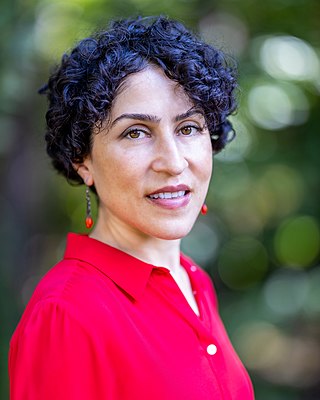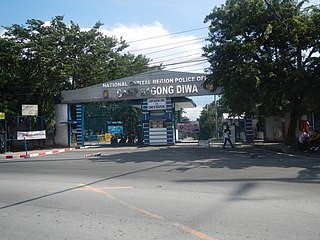U.S. Immigration and Customs Enforcement is a federal law enforcement agency under the U.S. Department of Homeland Security. ICE's stated mission is to protect the United States from cross-border crime and undocumented immigration that threaten national security and public safety.
Immigration detention is the policy of holding individuals suspected of visa violations, illegal entry or unauthorized arrival, as well as those subject to deportation and removal until a decision is made by immigration authorities to grant a visa and release them into the community, or to repatriate them to their country of departure. Mandatory detention refers to the practice of compulsorily detaining or imprisoning people who are considered to be illegal immigrants or unauthorized arrivals into a country. Some countries have set a maximum period of detention, while others permit indefinite detention.

CoreCivic, formerly the Corrections Corporation of America (CCA), is a company that owns and manages private prisons and detention centers and operates others on a concession basis. Co-founded in 1983 in Nashville, Tennessee by Thomas W. Beasley, Robert Crants, and T. Don Hutto, it received investments from the Tennessee Valley Authority, Vanderbilt University, and Jack C. Massey, the founder of Hospital Corporation of America.

Immigrant health care in the United States refers to the collective systems in the United States that deliver health care services to immigrants. The term "immigrant" is often used to encompass non-citizens of varying status; this includes permanent legal residents, refugees, and undocumented residents.

The GEO Group, Inc. (GEO) is a publicly traded C corporation that invests in private prisons and mental health facilities in the United States, Australia, South Africa, and the United Kingdom. Headquartered in Boca Raton, Florida, the company's facilities include illegal immigration detention centers, minimum security detention centers, and mental-health and residential-treatment facilities. It also operates government-owned facilities pursuant to management contracts. As of December 31, 2021, the company managed and/or owned 86,000 beds at 106 facilities. In 2019, agencies of the federal government of the United States generated 53% of the company's revenues. Up until 2021 the company was designated as a real estate investment trust, at which time the board of directors elected to reclassify as a C corporation under the stated goal of reducing the company's debt.

Northwest Detention Center is a privately-run detention center located on the tide flats of the Port of Tacoma in Tacoma, Washington, USA. The detention center is operated by the GEO Group on behalf of the U.S. Immigration and Customs Enforcement. The NWDC's current capacity is 1575, making it one of the largest detention centers in the United States. Numerous hunger strikes have been launched by inmates of the NWDC to protest the Center's poor conditions. Detainees have repeatedly reported overcrowding, a lack of medical attention, and severely unsanitary conditions, especially during COVID-19: "they're not even offering us soap."

The United States government holds tens of thousands of immigrants in detention under the control of Customs and Border Protection and the Immigration and Customs Enforcement (ICE).
Secure Communities is a data-sharing program that relies on coordination between federal, state, and local law enforcement agencies. The program was designed to "check the immigration status of every single person arrested by local police anywhere in the country". As part of the program, fingerprints that are taken upon arrest, which are traditionally forwarded to the FBI, are then also forwarded to the Department of Homeland Security (DHS). If these finger prints match the DHS's Automated Biometric Identification System (IDENT), then the ICE district office decides whether or not to issue a detainer request which can include requesting that the person be detained for up to 48 hours (I-247D), or a request for ICE to be notified upon their release (I-247N).

John T. Morton is a former American government official who served as the director of U.S. Immigration and Customs Enforcement (ICE) from 2009 to 2013. Morton was appointed unanimously by the U.S. Senate on May 12, 2009. Morton stepped down from ICE in July 2013 and currently works as the Chief Compliance and Ethics Officer at Capital One, a bank with headquarters in Virginia.
Willacy County Correctional Center is a closed detention center located on the east side of Route 77, at the edge of Raymondville City, Willacy County, Texas, United States.

Azadeh N. Shahshahani is an American human rights attorney based in Atlanta. She is the legal and advocacy director for Project South. She previously served as president of the National Lawyers Guild and director of the National Security/Immigrants' Rights Project for the American Civil Liberties Union (ACLU) of Georgia.

Adelanto Detention Facility is a privately operated immigration detention center in Adelanto, San Bernardino County, California. Owned and operated by the GEO Group, it consists of two separate facilities: East, which was an existing prison purchased in June 2010 from the City of Adelanto with a capacity of about 600 inmates, and the newly built West expansion completed in August 2012 with another 700 beds. After an additional expansion in 2015, the facility's capacity houses up to 1,940 immigrant detainees of all classification levels, with an average stay of 30 days.
Central Louisiana ICE Processing Center, known as CLIPC and formerly named LaSalle ICE Processing Center, is an immigration detention facility operated by the GEO Group and located at 830 Pinehill Road, about two miles northwest of downtown Jena, LaSalle Parish, Louisiana.

The Bureau of Immigration Bicutan Detention Center (BI–Bicutan) is the principal immigration detention center administered by the Bureau of Immigration of the Philippines. Located inside Camp Bagong Diwa, in Lower Bicutan, Taguig, the facility is known internally as the Warden Facility and Protection Unit (WFPU). However, in press releases and public statements, the Bureau variously refers to the facility as a "jail", "warden facility" or "detention center". The function of the facility is to hold foreign detainees who are awaiting deportation, for example, because they have pending criminal cases, or because they are accused of having overstayed their visas.
Carlos Ernesto Escobar Mejía was a 57-year-old man from El Salvador who had immigrated to the United States in 1980 and lived in Los Angeles for over 20 years. He had left the country after the Salvadoran Civil War, a US-backed military conflict, broke out. In an article on Escobar Mejía's death, Graig Graziosi of The Independent reported on the tragic web of violence that surrounded his life, after "US-backed death squads terrorized civilians and were accused of raping and murdering American missionaries" while using "scorched earth" tactics contributed to the scattering of civilian populations. Carlos and his sister Rosa Escobedo Mejía fled to the US to live with their older sister Maribel. His status in the US was undocumented. On May 6, 2020, he was reportedly the first immigrant to die from COVID-19 in the custody of U.S. Immigration and Customs Enforcement (ICE) and the 11th immigrant to die in government custody in the fiscal year. He died at the Paradise Valley Hospital in National City.
The COVID-19 pandemic in U.S. immigration detention has been covered extensively since the onset of the COVID-19 pandemic in the United States. More than 38,000 people were detained by U.S. Immigration and Customs Enforcement (ICE) at the time of the outbreak of COVID-19 in the United States. ICE's response to the outbreak in detention facilities has been widely characterized as substandard and dangerous. Harmful practices have been reported in numerous facilities managed by third-party private contractors with ICE. For example, reports found that HDQ Neutral disinfectant was used over 50 times per day in un-ventilated areas, which caused pain, bleeding, and severe illness to numerous people held in Adelanto Detention Center, a private prison managed by GEO Group Inc.

The New Way Forward Act is a proposed legislation introduced in the U.S. Senate and House on December 10, 2019 by Jesús "Chuy" García, which focuses on immigration reform. The bill would repeal sections 1325 and 1326 of the immigration law to decriminalize unauthorized border crossing whilst maintaining civil deportation procedures. The bill intends to give immigration judges discretion when deciding immigration claims for immigrants with criminal records in the United States, changes immigration enforcement by ending mandatory detention in specific cases and intends to remove private detention centers for immigrants.
Mental health consequences of immigration detention include higher rates of depression, anxiety, PTSD, schizophrenia conduct issues, hyperactivity, compared to the general population. These harmful impacts exist regardless of past traumatic experiences, age, or nationality, or even time elapsed. Immigration detention may take place at country or state borders, in certain international jurisdiction zones, on offshore islands, boats, camps, or could even be in the form of house arrest. The use of immigration detention around the world has increased recently, leading to greater concerns about the health and wellbeing of detained migrants. A 2018 scoping review from BMC Psychiatry gathered information showing that immigration detention consistently results in negative impacts on detainees.
The Glades County Detention Center, at 1297 East State Road 78 in remote Moore Haven, Florida, United States, opened in 2007 with 440 beds. Operated by the Glades County Sheriff's Office, besides Glades County arrestees, 90% of its beds house Immigration and Customs Enforcement detainees, which were previously spread around many county jails. It is Glades County's largest employer. It has been the site of widespread abuses, and in 2022, 17 members of Congress asked that it be closed.
In 2011, the U.S. Immigration and Customs Enforcement Agency revised its national detention standards and developed the Performance-Based National Detention Standards. According to U.S. Immigration and Customs Enforcement, "the PBNDS 2011 are crafted to improve medical and mental health services, increase access to legal services and religious opportunities, improve communication with detainees with no or limited English proficiency, improve the process for reporting and responding to complaints, and increase recreation and visitation." The PBNDS of 2011 is an important step in United States detention reform. Many revisions reflect efforts to tailor detention practices to the United States border's unique demands and circumstances. The PBNDS of 2011 revised detention standards among seven different sections. Although all sections detail essential contributions to improving the safety, security, order, care, activities, justice, and administration/management of U.S. border control, there are sections pertaining to the specific conditions of undocumented women.











